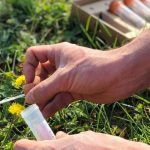
Biologicals

Syngenta rolls out Envita Dry nitrogen-fixing biological
Envita Dry ‘gives plants ability to source additional nitrogen from atmosphere’

Biologicals, biostimulants make way into Prairie crop plans
But with more companies entering the biologicals and biostimulant space, Prairie growers are being urged to look past the hype and dig into the data

Demystifying biological inputs
A new partnership brings science-based field data to ag input listings to help growers sort fact from fiction

Using nematodes to control crop pests
Alberta research and U.S. commercialization suggest soil-dwelling nematodes could become a practical option for Prairie pest control

Syngenta to study pharma chem for farm uses
Crop chem firm Syngenta reaches a chemistry deal with one of its own former parents.

Supplementing seed with seafood
Active ingredient comes from ‘upcycled’ seafood byproducts

Plant-based plant protection

New biological aims to boost row crops’ yield

Biologicals aren’t the silver bullet
The products can be complements, not replacements, for other inputs

Nitrogen-fixing biologicals fall short at field level
Challenges remain for products to achieve their hoped-for potential


